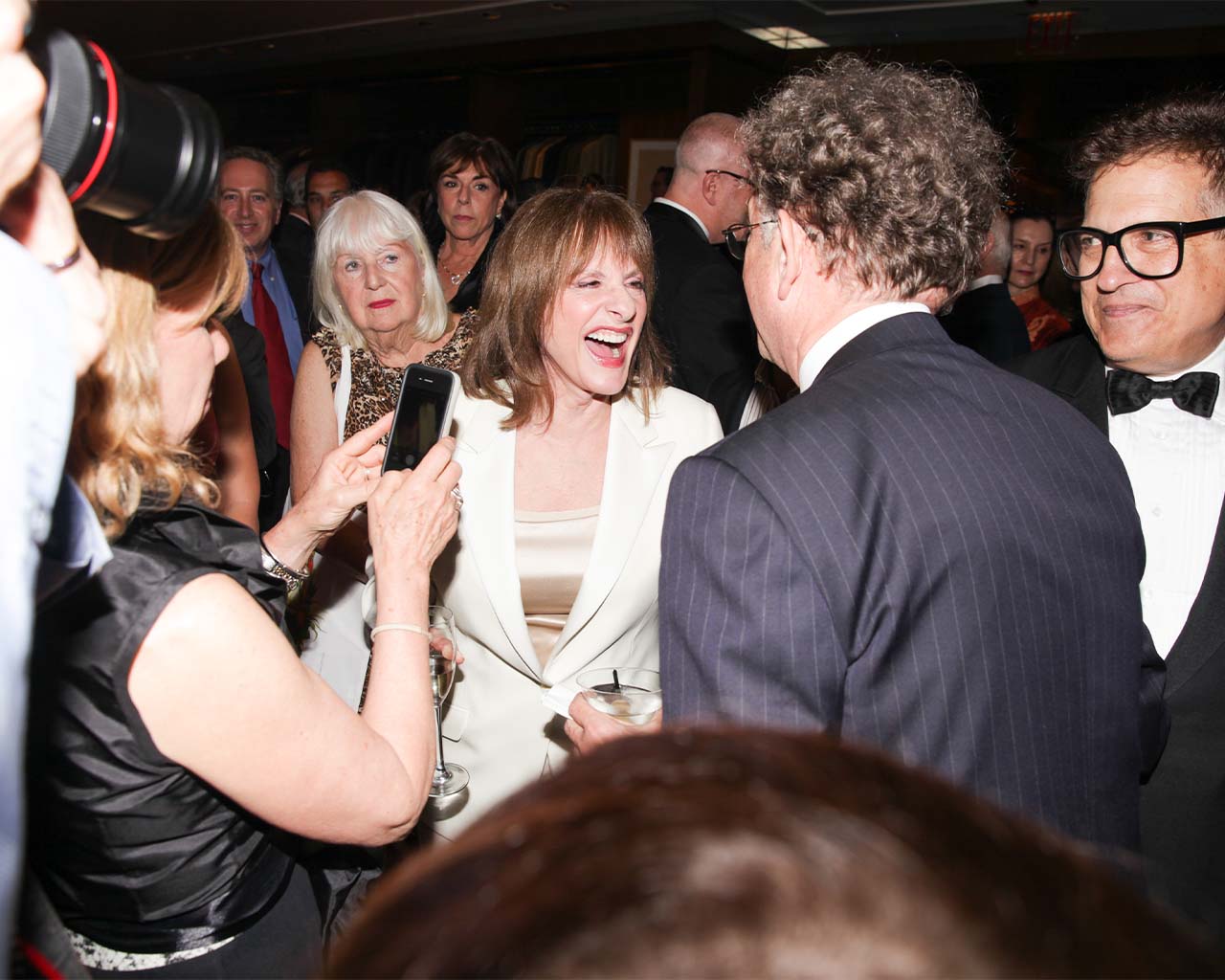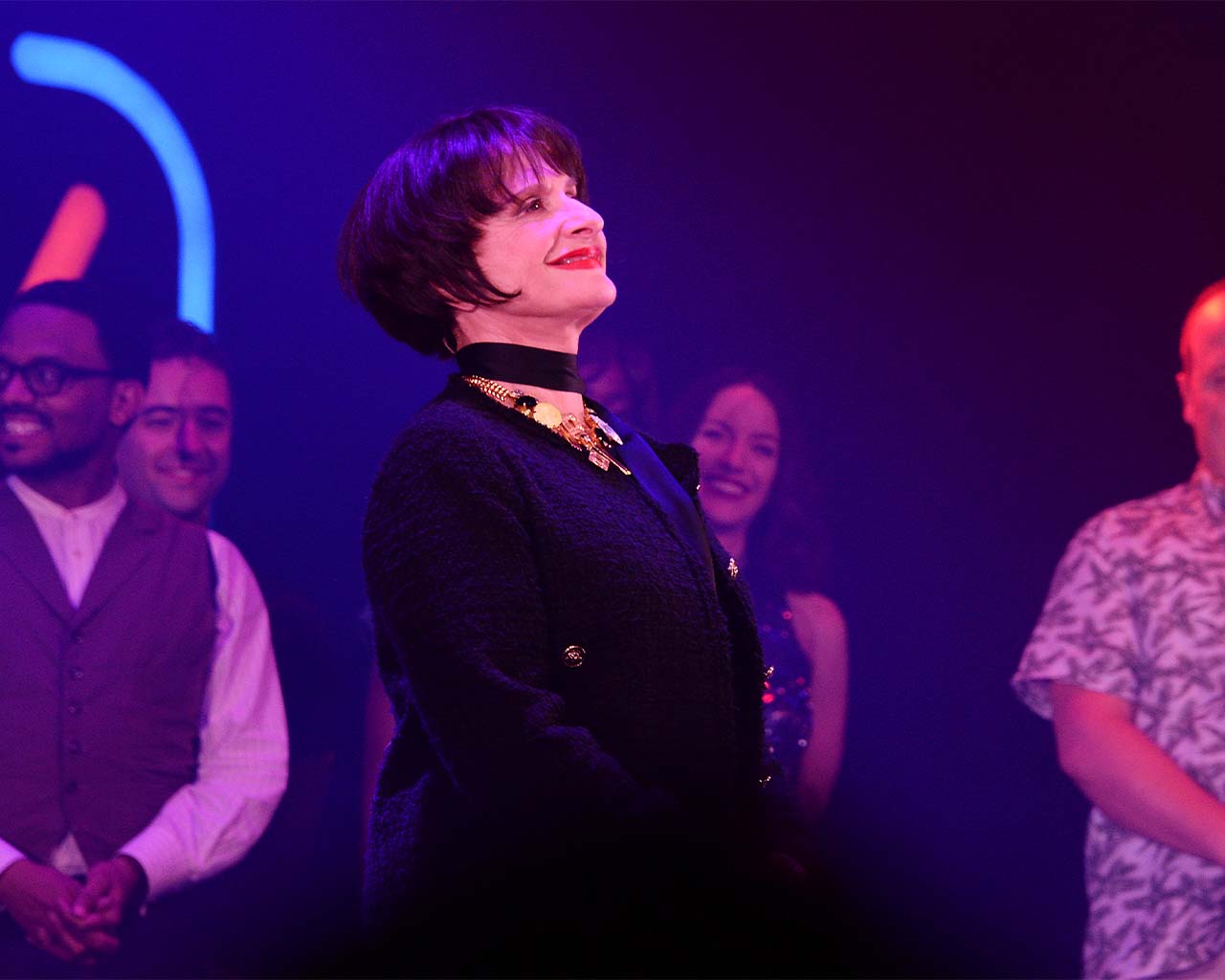

Patti LuPone won the Olivier Award for her portrayal of Joanne in the revival of Stephen Sondheim’s Company at the Gielgud Theatre in London’s West End which closed in March of 2019. This “distaff” production – directed by Marianne Elliott and approved by Sondheim in which the gender of the lead characters was changed – had been scheduled to open in New York with a a wholly new cast except for the irreplaceable LuPone until the pandemic shut down Broadway. It was announced recently that Company’s highly anticipated Broadway relaunching, which had been scheduled for December, would now be moved up to November. The announcement was a reason to revisit a conversation I had with Patti LuPone in her dressing room at the Gielgud Theatre a couple of weeks before that earlier London production closed.
I may have seen more performances by Patti LuPone than I have by any other actor. I discovered her during my first few months attending the Juilliard School’s Drama Division in 1975 – her alma mater as well – when The Acting Company, which was an outgrowth of the first few acting groups that attended Juilliard, had a season of rep at New York’s Harkness Theatre on Broadway and 62nd Street. The Harkness was demolished a couple of years later but nothing can demolish my memories of that Acting Company stand there. The season consisted of the musical The Robber Bridegroom, based on the Eudora Welty novel, in which LuPone starred as Rosamund; Marlowe’s Edward II in which she played the title character’s young son; Saroyan’s The Time of Your Life in which she portrayed the streetwalker Kitty Duval; and Chekhov’s Three Sisters in which she played Irina. I have been her fan ever since.
I have seen her in Evita, The Water Engine, The Woods, Edmund, Anything Goes, Sunset Boulevard, Master Class, Sweeney Todd, Noises Off, Gypsy, The Rise and Fall of the City of Mahagonny, Women on the Verge of a Nervous Breakdown, her one-woman show Patti LuPone on Broadway, An Evening with Patti LuPone and Mandy Patinkin, Shows for Days, War Paint, and the staged concert version of Company for New York Philharmonic as well as that production on the West End. I look forward to seeing her in the Broadway production later this year in which the lead role of Bobbie will be played by Katrina Link.
When I arrived at LuPone’s Gielgud Theatre dressing room back in March 2019 a couple of weeks before the show’s closing, she was wearing her “dressing room” shirt, a blue one with two patches on it. One patch had Twelfth Night stitched on it. The other was stitched with the name of David, which is a tribute to her close friend, playwright David Mamet. She has appeared in more Mamet plays than in work by any other writer, which led to the beginning of our conversation.
I am curious about the political dynamic of your friendship with David Mamet. He’s so right-wing now. And you certainly are not. You’re both very political. How does that work?
David and I don’t talk politics. I’m too possessive of our friendship. I mean, I’ve got other friends who voted for Trump and I’m still friends with them even though I don’t understand them. One set of friends, I don’t even dare ask what they think now. They are lifelong Republicans, but they are also extremely intelligent and sensitive people so obviously I can’t think that they see what is going on and still support this man … But I don’t think they want to be made to feel like fools or losers because they voted for him. I came of age in New York in the 1980s when this idiot Trump came of age. I know who this motherf*cker is. It shocks me that people voted for him and that they were conned by him. That’s his modus operandi.
We had a home for a time down in Edisto, South Carolina. I said to my husband after we bought the property in Edisto, “Why didn’t we ask them about religion, taxes, and politics?” Because we were in a blood red state. Oh, dig this! The Chief of Police before he was the Chief of Police was a deputy whatever. They know who I am down there and they watched the house when we were not down there because we weren’t down there that much. He told me he’d come by and make sure the house was safe and he’d sit on my porch and have lunch. I told him he was more than welcome to do that. And in an emergency they wanted to use our roof for radio control because it was flat or whatever. He became the Chief of Police and I wanted to pay him back and I said, “Why don’t you come over for dinner.” But I was terrified that I was going to meet his wife. Well, I wasn’t terrified I was going to meet his wife. I was terrified because I didn’t know what I was going to get from him and her. He is a lovely guy, but I was sure they were Trump voters. So she walked in the door – a lovely lady – and not a minute into being in my house she goes, “I hate Trump.” And I was, ohmygod, there are likeminded people down here!
Speaking of likeminded southerners, Eudora Welty came to see you in The Robber Bridegroom during that stand at the Harkness. I have a memory of walking Miss Welty back to the Algonquin after a performance. She was part of coterie of people in Jackson, Mississippi, around a theatre troupe there called New Stage Theatre. They welcomed me into their fold and mentored me as a teenager. Am I right in remembering her coming to see you as Rosamund in The Robber Bridegroom?
Yep. Yep. We met her. Of course, she would have stayed at the Algonquin. Of course, she did. Her face was so bright. She had those big teeth. And when she smiled, it was: OhmyGod! She was incredible. And that was such a great production. Those were some of the sweetest moments I’ve ever spent on a stage in The Robber Bridegroom.
You looked so happy at the curtain call for Company at the performance I saw. You must be making some lovely, lasting memories of the sweet moments in this production. I’ve seen you in some productions when I’ve wondered if you were happy in them. Bad memories and magnificent performances could be a subtext of some your work. Evita might fall into that category based on your memoir. Sunset Boulevard certainly. But are you as happy as you seem being in this production?

I think there are very few times I’ve been unhappy at a curtain call. But this company is extraordinary. We are all sensing a loss about our closing. We haven’t even been together long enough to get sick of each other. It has been the most copacetic company. I have been lucky for the last three or four musicals. Gypsy was that way. War Paint was that way. This is that way. Marianne [Elliott, Company’s director] is this … ah … thing. I don’t even know how to describe her because I’ve used every adjective in the world. But she is incredibly special in how she can put together a company. It is interesting to me how this particular company came together and the responsibility that each of us feels because everyone is a principal, pretty much, while at the same time everybody is playing a featured part. The combination of personalities is extraordinary. Everybody cares, supports, and loves each other. If there’s a problem, everybody comes around that person to protect them. And Rosie [Rosalie Craig who played Bobbie in the London production] and I look at each other at the curtain call and we just want to burst into tears because it’s been an extraordinary experience.
When it goes to New York – and I can’t imagine its not going and your not doing Joanne there – and if it is recast around you, I hope that you have the same happy experience. I trust you will because of what you have said about Marianne and her shaping of a company. One of the things that Marianne has “shaped” in the narrative of the show is making it to me about alcoholism in some deep-seated way. I don’t remember the male Bobbys in the earlier productions I’ve seen drinking as much as the female Bobbie in this production does. It’s as if your character of Joanne were grooming her to be an alcoholic since I think Joanne is certainly one. Has it become a show about alcoholism in some way?
That is one of the things different about this production, yes: Bobbie’s drinking. I don’t know about the alcoholism. I am definitely a professional drinker in it and Marianne has laced in all that alcohol for Bobbie. And we do get together on that drinking element. And Joanne is mentoring her. Everything you just said. But the alcoholism, I don’t think it’s about that. She does however give her husband to her in that “Ladies Who Lunch” bar scene because of her insecurity and so she will still be in control of the situation. And he won’t leave her. She will leave him. But all that other stuff, well, the fact that you got all that out of it, Kevin, is fantastic for what is theatre except the interpretation that the audience brings to it.
Marianne mined the scenes. This was the first musical I ever worked on where the priorities were the scene work. No music. That was the least important thing … It is a fantastic book by George Furth and that is what Marianne did: she mined those scenes in the book. Those were what our rehearsals were about. You know when you usually do a musical, it’s a meet-and-greet, then: music. Or meet-and-greet, then: choreography. But you very rarely work on the book. And Marianne works on the book. And then the assistant director would have meetings with us and we’d have to come up with backstories for our characters and our relationships. How did we meet, blah-blah-blah, which is what we don’t do in the states. Even when you’re doing a play, you don’t have those individual meetings with your partner with another director.
When we got to that “Ladies Who Lunch” scene with Joanne and Bobbie, Rosie and I both looked at the bar stools and the table and my first thought was, “I’m not gonna get back up on it if I get off it.” Marianne said, “What do you want to do, Patti?” And I said, “Let’s just sit here and see what happens.” And that’s what she wanted. The thing that was so brilliant is that she kept it all inside the scene. She kept the song inside the scene. And then some place within the rehearsal hall I found it – not sure when, I have to talk to her about this – I turned it all to Bobbie and sang “and here’s to the girls who just watch …”
And then two seconds later when the song is over, I say to her “Watch: did you hear what you just said? Watch.” And I’ve played this part and I never made that connection. I’m assuming it’s written about Joanne who is the one that’s just watching commenting on her society, her class. But when we turned it in, it was such a revelation. And to keep the whole thing within the scene was so important.
Because you are who you are, Patti, and you can do that eleven-o’clock number thing and just blow the f*cking roof off the theatre and people adore you for it and we want to scream for you, we forget about the quiet skill you’ve got and how well-honed your art is. That other stuff is part of the service aspect of your being an artist: you give people that kind of moment we long for from you. We long to love you. You’re okay with our longing for that. Okay, you seem to be saying, you want that from me then here it is, I will give it to you, here’s the big moment. But because of that, sometimes one forgets what a great actress you are and how subtle you can be. Subtlety and Patti LuPone don’t go together usually. It is not part of your legend. But it is what I have long loved about you – the incongruity of the big belter who has these subtle notes as a serious actress. What role does stillness play in acting?

I was just telling someone today that it used to be when we were kids that rehearsal led to performance. We’re finally on the stage and we’re out of rehearsal! Now, to me, it’s all about the rehearsal. It’s all about the rehearsal. Maybe it’s age. Maybe it’s a settling or something where for me the rehearsal is more important than the performance.
And yet, that’s what I love about a long run. I’m not the brightest bulb in the bulb box. I never was. But the long runs have taught me how to edit. I have come to see my pattern. I’m working off adrenalin for the first three months. And then I get bored. I go, ohmyGod, I’ve got nine more months to go.
But that’s when I stop acting and then all of a sudden these bubbles are bursting and the work begins. And I always think that the thing to do is to get down to that moment when you’re not doing anything. You’re not doing anything.
And where do we look when we’re watching a performance or watching a play? Don’t we always gravitate to the guy or the woman who is just standing there? What are they doing? What are they thinking? What’s going on? The one who’s perfectly still. It is the hardest thing to achieve. I’ve learned … oh, it takes forever … it’s all that cliché talk too: in the moment … do you know what I mean? … listen … it’s all that cliché talk .. but it’s so true. It’s so true. To bring this full circle back to David Mamet. David always says to give each word its proper weight. That’s true. It’s hard to understand what that means, but if you don’t think you need to do more, then that opens it up. That takes confidence on the actor’s part because most of us are deeply insecure and think we have to do more when we really don’t.













